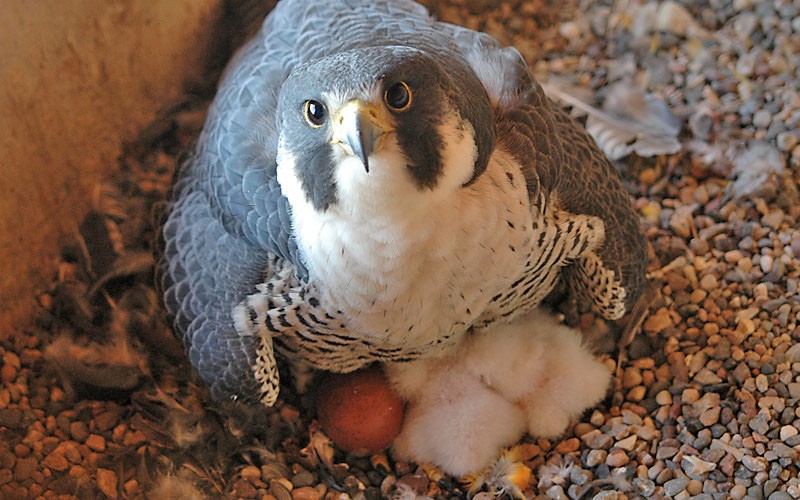Protected falcons hatched no chicks at Castle Rock last year, nesting area closed until Aug.

 WALNUT CREEK, CA—It’s time once again for the annual reminder that the Castle Rock formation overlooking Diablo Foothills Regional Park near Walnut Creek is closed to public access from now through July 31 to allow peregrine falcons to nest in peace.
WALNUT CREEK, CA—It’s time once again for the annual reminder that the Castle Rock formation overlooking Diablo Foothills Regional Park near Walnut Creek is closed to public access from now through July 31 to allow peregrine falcons to nest in peace.
The rocks are located in Mt. Diablo State Park, but visitors usually access them from the Stage Road Trail in Diablo Foothills. Signs are posted at several access points advising of the closure. In general, the boundary line is Pine Creek.
Peregrine falcons are remarkable birds. About the size of crows, they prey mostly on smaller birds, but also on mammals including rodents and bats. They are capable of diving at speeds of more than 200 miles per hour, which makes them the world’s fastest animal.
Peregrines are no longer on the federal endangered species list, but in California they are still fully protected under the state’s Fish & Game Code.
It’s vital to leave them alone during the nesting season, which runs from Feb. 1 to July 31. If disturbed, they can fail to mate or abandon their nests.
An all-volunteer natural history education team keeps watch on the peregrines at Castle Rock during the mating season. In 2020, two pairs of nesting peregrines were seen in the rocks. However, neither pair ever settled into incubation, so no chicks hatched. Usually there’s just one nesting pair up in the rocks; the presence of two may have been distracting. Peregrines are very territorial.
So please don’t venture up into the rocks during the peregrines’ mating season. Everyone’s cooperation is appreciated. Trespassers can be cited and the fine is expensive.
COVID closures
Since we’re on the subject of closures, remember that a few regional parks and facilities remain closed due to COVID-19-related restrictions. The main examples are Ardenwood Historic Farm in Fremont, the Regional Parks Botanic Garden in Tilden Regional Park near Berkeley, and all visitor centers.
Other parklands can be closed due to adverse weather conditions such as high winds.
To check on park status before heading out, go to the park district website, www.ebparks.org. At the top of the home page, click on “COVID-19 Closures.” Farther down the page, you can put the cursor on “Parks & Trails”, then click on “Park & Trail Closures.”
Also on the “Parks & Trails” menu is a “Report Incident” option, where you can report non-emergency situations, hazardous trail conditions, etc. For emergencies or park rule violations, call the park district public safety department dispatchers at (510) 881-1121.
New parkland plan
The park district is in the process of planning public access for 3.89 acres of new parkland at Robert W. Crown Memorial State Beach in Alameda, next to Crab Cove Visitor Center. The “McKay Master Plan” also includes street improvements along McKay Avenue for better traffic circulation, and proposed new recreational facilities.
You can find out more about the project and take an online survey to offer your input on the plan. To do so, visit www.ebparks.org/McKayMasterPlan.
Ned MacKay writes a regular column about East Bay Regional Park District sites and activities. Email him at nedmackay@comcast.net.
